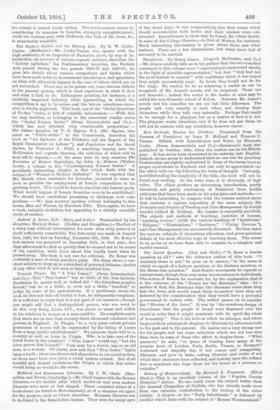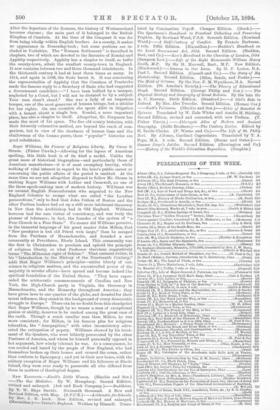History of Westmoreland. By Richard S. Ferguson. (Eliot Stock.)—This is
an excellent volume of the " Popular County Histories" Series. No one could know his subject better than the learned Chancellor of Carlisle, who has already made more than one valuable contribution to the history of the sister county. A chapter on the "Early Inhabitants" is followed by another which deals with the subject of "Roman Westmoreland."
After the departure of the Romans, the history of Westmoreland becomes obscure ; the main part of it belonged to the British Kingdom of Cumbria. At the time of the Conquest it was far from being whollor within English borders. As a county, it makes no appearance in Domesday-book ; but some portions are in- cluded in Yorkshire. The "Norman Settlement" is described in chapters, two of which are devoted to the Baronies of Kendal and Appleby respectively. Appleby has a chapter to itself, as befits the county-town, albeit the smallest county-town in England. It now contains between two and three thousand inhabitants. In the thirteenth century it had at least three times as many. In 1314, and again in 1388, the Scots burnt it. It was concerning the representation of Appleby that the Countess of Pembroke made the famous reply to a Secretary of State who had suggested a Government candidate :—" I have been bullied by a usurper, neglected by a Court, but I will not be dictated to by a subject. Your man shan't stand." She was a lady of an imperious temper, one of the most generous of human beings, but a stickler for her rights. On one occasion she spent -3200 in litigation with a tenant about a single hen, Kendal, a more important place, has also a chapter to itself. Altogether, Mr. Ferguson has made the most of his space. The the old county histories, with their leisurely exhaustive method, are beyond the reach of com- parison, but in view of the shortness of human time and the shallowness of the human purse, these " popular " histories are good substitutes.



















































 Previous page
Previous page